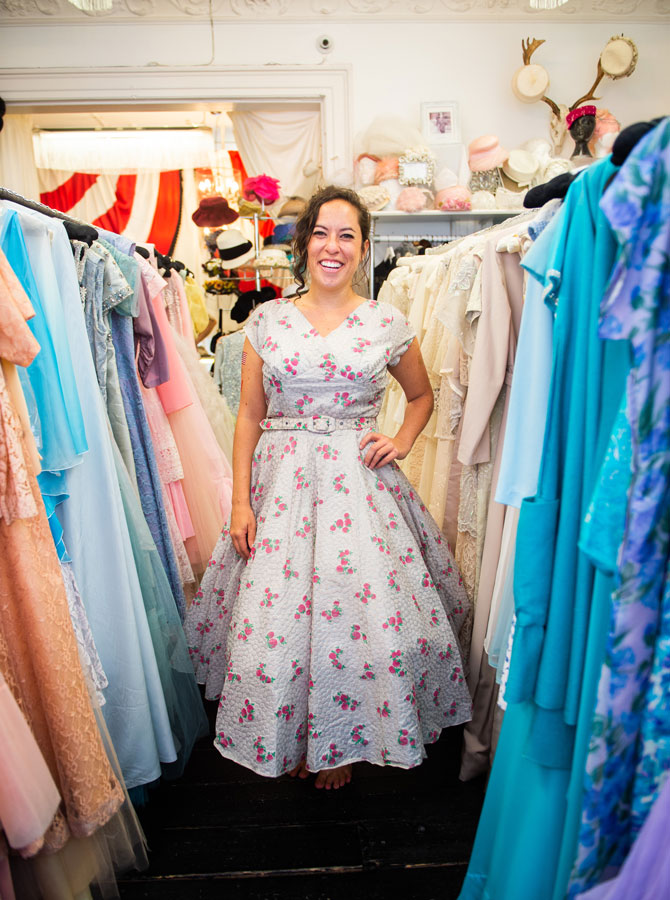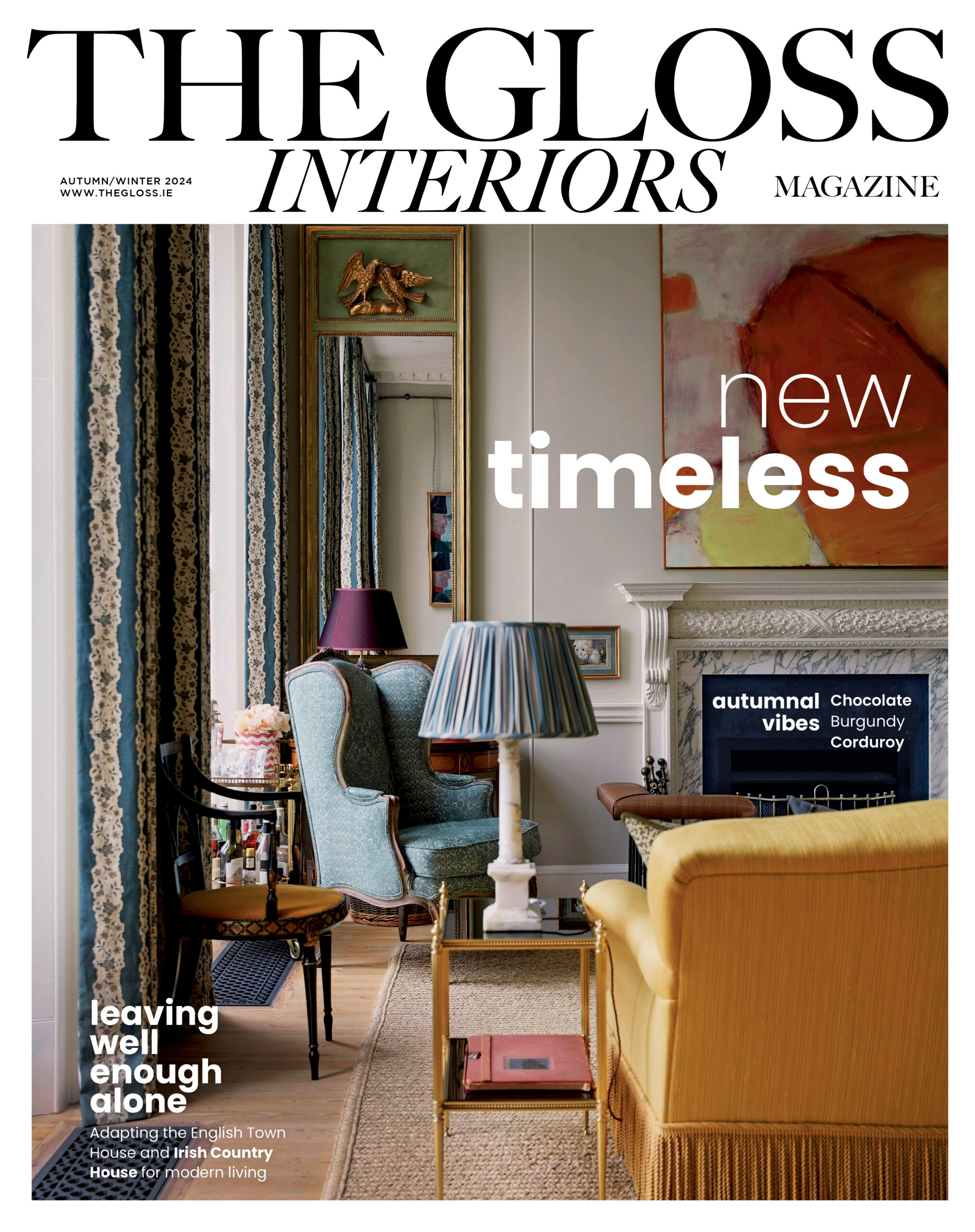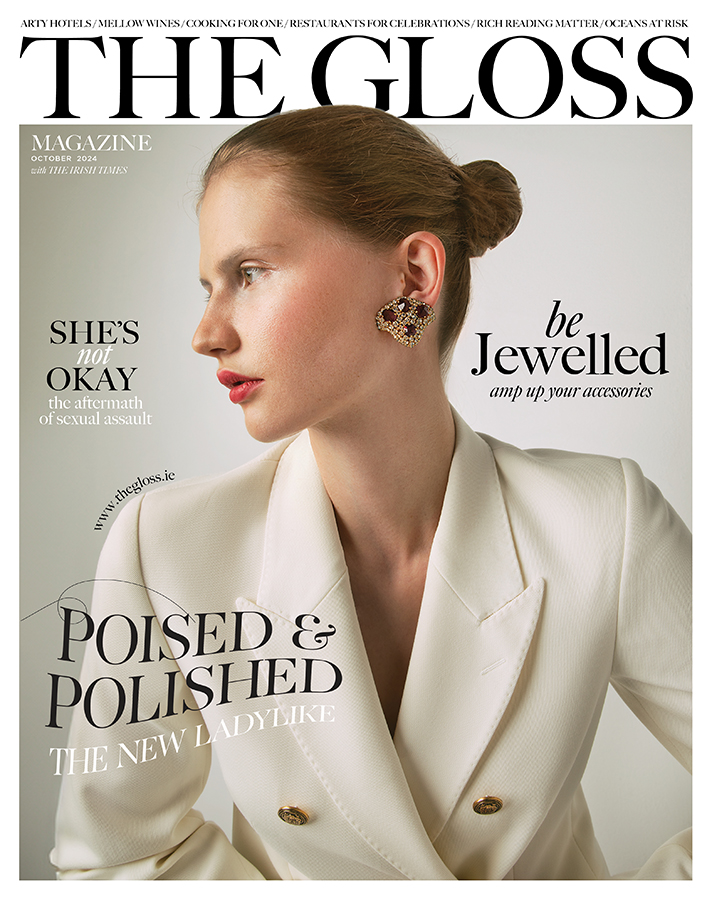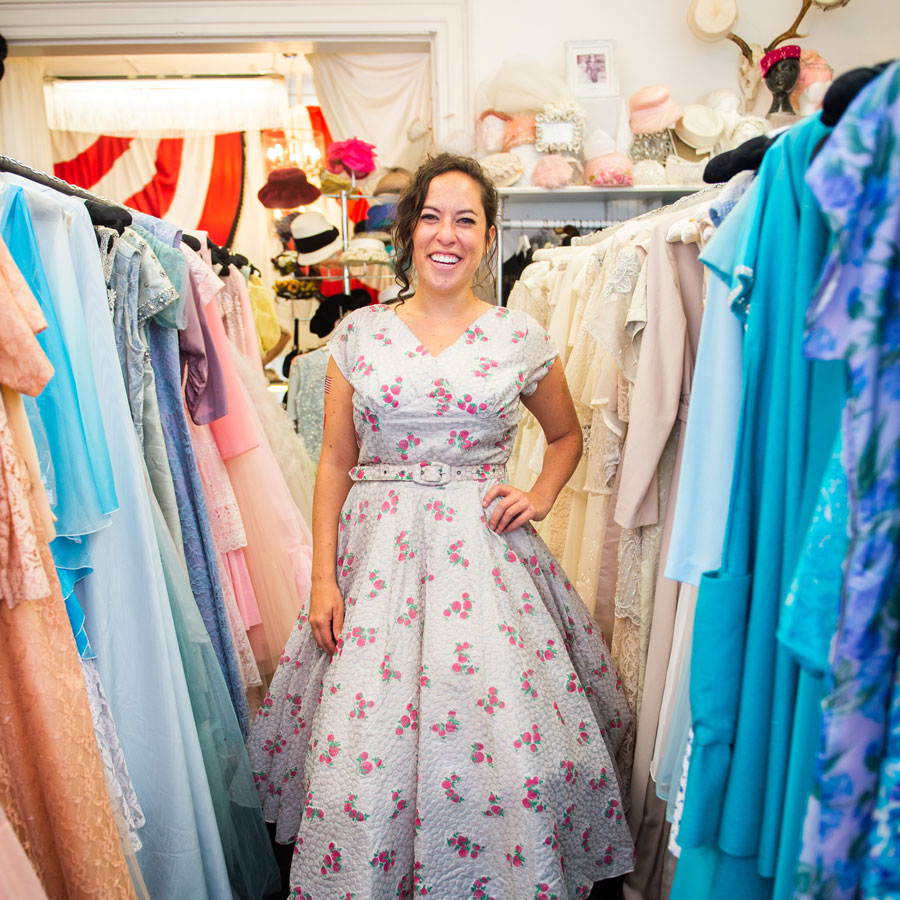We teamed up with Katriona Flynn, lecturer in fashion at TU Dublin, to ask readers to share their story of a dress that has played an important role in their lives. We were struck by the huge response, and how the physical features of the dresses played second string to the human stories around them, and the memories embedded within. Here’s a selection …
Submit your own ‘Story of A Dress’ to amy@thegloss.ie and discover more stories online throughout the series. See the details of a new Desert Island Dress Podcast coming soon, created by Katriona Flynn and Dr Dee Duffy below.

A David Classic by Ruth O’Connor
In this very magazine, in 2016, I wrote an article about the items in my wardrobe I couldn’t bring myself to part with for reasons sentimental or historical. Some years after the article was printed I was contacted by a woman who had read the article online and who sent me an intriguing email. And the rest, as they say, is history.
The email, from an American woman called Rachael Garcia, went as follows:
“Dear Ruth … I know you wrote about your aunt’s dress being a piece with which you have a deep emotional connection but I was wondering if there would be any chance of you parting with it? You see, the designer was my father, Derek David Garcia … I can’t find the words to describe just how much it would mean to me, and I know that my mother and brothers would also be moved, if I could bring it back to California where my family settled in 1987.”
“Unfortunately, my father passed away six years ago, but I’m left with stories of runway models getting stranded and having to find last-minute replacements, old advertisements cut out from magazines and newspapers, and memories of how his face would light up when talking about that time of his life. I had planned to visit his old shop on Wicklow Street but I had never imagined that I might be able to see one of his pieces in real life. As I read your article my heart seriously went crazy with the thought.”
The dress in question is a beautiful 1950s dress – with an embossed pattern of raspberries, a matching belt at the waist, and a swing label that emphatically asserts it to be a “David Classic” and therefore: “A perfectly satisfactory garment, designed with carefully planned details to enhance and flatter the essential charm that is yours”. Given to me as a vintage-obsessed teen of around 17, the dress had been rarely worn and in perfect condition complete with labels, since my grandmother bought it for my aunt when she too was around 17. How could I bear to part with such a precious possession?
I called up my aunt, who has sadly passed away since this meeting. Telling her the story she responded in characteristic fashion: “Petsy, when I gave you that dress I gave it to you – you do whatever you think is right.” Arranging to meet the American I phoned Ruth Medjber – a photographer with a passion for people and for tales of Dublin. “I think there’s a story here,” I told her. “Will you come along tomorrow?”
Rachael Garcia told us that her father’s shop had been at 15a Wicklow Street (where The Secret Bookstore and Freebird Records are now) and so we agreed to meet at iconic Dublin jewellers Weir & Sons. We were soon approached by a petite 29-year-old and thus began a day that would tie two women, two generations and two continents together by a thread. One that would unlock a family history and uncover the story of one Jewish family’s involvement in Ireland’s clothing trade for more than 20 years.
Just a step down the road from the former David Classic showrooms at 15a Wicklow Street, the owners of vintage store Dirty Fabulous (now in Roosky, Co Monaghan), Caroline Quinn and Kathy Sherry, welcomed us in to take the photos you see on these pages. Bowled over by the condition of the dress, unworn and its labels intact, they explained how unusual it was that an Irish dress of this era and age should have survived in such pristine condition. Due to economic restraints, many garments of the day were altered as hand-me-downs until they were little more than a dress for a child or perhaps even a doll.
This dress they explained with some emphasis was very rare and very special, seeming to hint that I’d be mad to part with it – surviving as it had thanks to being made with innovative (at the time) “100 per cent nylon” and having been stored safely for decades. “But then,” sighed Caroline as only a lover of vintage can, “Perhaps you have to let it fulfil its Dress Destiny.”
Destiny interjected and tears of raw emotion flowed when Rachael emerged from the changing room – the dress fitting her as though by design. “I feel like my father made this for me from the past,” she said. There was no question about it – she was keeping the dress.
The Dublin City Library and Archive on Pearse Street contains newspapers, photographs, maps and special collections including the detailed account of Jewish families in Ireland by scholar, archivist and genealogist Stuart Rosenblatt, founder of the Irish Jewish Family History Database. That day, looking through the files in the archives, we began to uncover the story of the David Classic label and of Edette – the brand owned by Rachael’s grandfather Henry (Harry) Garcia and, by all accounts, a significant employer in Dublin.
Harry Garcia was born in London in 1895 but moved his family to Ireland in 1939. He quickly established Grafton Manufacturing Co Ltd. (1939-1947) with Sidney Barrett – the object being to “Manufacture, buy and sell and distribute wearing apparel”. He went on to establish several other companies including Edette, Edde Ltd., Ruby Ltd. and Edette (Exports) Ltd.
Born in 1928, at six years old, Rachael’s father Derek David Garcia developed polio while living in London – a condition that would require many childhood operations and that would see him determined to prove himself as a successful young man. Notably many of the charity fashion shows hosted by Edette and David Classic were in aid of the Little Willie Fund – a Dublin charity for young boys with polio.
The family initially lived, like many other Jewish families, on the South Circular Road in the vicinity of the synagogue, in what became known at the time as Little Jerusalem. They would later move to Springvale in Palmerstown near King’s Hospital School in what would have been a rural setting on the main road to the West but still near enough to Dublin city where they had offices and manufacturing facilities at South King Street, Andrew’s Lane and Capel Street.
According to Rachael’s father’s memoirs, at 19, Derek declined the offer to work at Edette, preferring to receive a cash injection to set up his own label in the corner of one of his father’s manufacturing facilities, with just three machinists, a finisher and a cutter. While Edette specialised in women’s coats and dresses as well as in children’s apparel, the David Classic label seems to have been a more youthful, fashion-forward label with designs delightfully described as “In the Parisian style” or as “Hollywood styled”.
A fabulous Irish Press article in 1955 entitled “Welcome Customer … A Film Star drops in …” sees actress Joan Rice visit various Dublin shops in a chauffeur-driven Chrysler. In a proto-influencer moment, she visits the Gaeltara Eireann shop where she selects a herringbone tweed piece by Joe Diver in Kilcar; Boylan’s, where she selects a pair of shoes made by Woodington’s of Drogheda, and The Swiss Gem jewellery shop where she chooses a marcasite Tara brooch with amethyst stones. On then to the David Classic showroom on Wicklow Street where she chooses a “Wine grosgrain – the large collar cleverly trimmed with novelty braid” and a “beautifully styled silver and black gown in the newest material called ‘Crystaline’”.
An advertisement for David Classic in the Irish Independent dated March 1955: “As always, the cut is perfection … the style is fashion’s latest and the fabric is the latest ‘Crystaline’”. In June 1957, a fashion competition in the same paper in which readers selected their favourites from the Dance Original collection by David Classic, showed designs worn by models from the Miriam Woodbine Mannequin Agency.
In February 1958, readers of the Sunday Independent had the chance to win a trip to Lourdes plus a whopping ?100 by selecting their favourite styles from the Hollywood styled King Kotton collection by David Classic. And in April 1961, the same paper showed dresses worn by models from the Violet Collins Agency, for a competition offering readers the chance to win a 19” TV screen complete with aerials, or two Tissot watches.
A delightful article in 1958 describes the new “dawn-to-dusk” collection by David Classic as “as new as tomorrow” observing, however, the need for “lovely legs” in order to carry off the “shortest skirts yet seen at a Dublin fashion parade” and a nifty circular skirt which doubled up as a cape for “sun scorched shoulders”.
Rachael’s father seems to have been a very modern thinker, and, as someone with a disability himself, was keen to help others with the same experience. A midnight fashion parade and cabaret in the Gresham Hotel in March 1958 in aid of the Little Willie Fund raised money for the Baldoyle Orthopaedic Hospital showcasing clothes “for every aspect of Irish life … from racing suits to beach bloomers in purple and gold striped satin”.
An excerpt from Derek’s memoirs helps explain the drive he had to succeed: “Filling in every moment constructively became important to me, despite the struggles against my handicap. More than that, I felt a need to achieve perfection in everything I did. When I felt anxious about what I was going to do with my adult life and could see only darkness instead of a direction, I simply worked harder at whatever I was doing.”
In 1958, a journalist in the Cork Examiner commented on the outstanding Italian fabrics used “including one with a Broderie Anglaise effect achieved by flock printing on grosgrain or taffeta” – which sounds remarkably similar to the raised raspberry pattern on my dress. The journalist is also quick to remark on the “outsized models” for the “fuller figure” – commending the colours, patterns and prices while another article in the Evening Press commends the designs for women under 5’2” revealed at a show in the Gaiety Theatre – with none other than Maureen Potter as a “mannequin”.
Despite the apparent popularity of the brand, Derek’s career was not without its ups and downs. Orders were sometimes sent back or creditors flunked on payments, some designs worked and some didn’t, there were misguided business decisions, even clashes with senior Jewish clerics and other business people in the community.
When Rachael’s grandfather, founder of Edette, died in Spain in 1960, the family moved back to England where Derek went on to build and develop a chain of hotels in London, Paris and Amsterdam with his brother Eddie, including the Chelsea and Curzon hotels in Mayfair and a hotel on the rue St Honoré in Paris. Times had changed for the family and there were, as he put it, “only so many dresses people can afford to buy. Especially here in Ireland”. After 20 years in London, Derek moved with his wife and three sons to California where Rachael was born.
What remains today is the wisp of a business found in the folds of skirt and bodice, a roll of garment labels, family photos and newspaper clippings. If the David Classic label was a successful one with three shops at one stage, then the Edette label had even more of a footing in the Irish market. Both labels were founded when quality, glamour and style were the height of fashion.
Since we met, Rachael has worn the dress to her 30th birthday party and says her family are overwhelmed by her whole experience. “I mean, it’s really unbelievable. It’s impossible to put into words what it is like to have something tangible that my dad made all those years ago. It’s hard to explain what it’s like having something he made that survived all this time and that someone else cherished. I don’t know what my father would think about it all – perhaps he’d be surprised or perhaps he’d say: ‘Well, of course – after all, I made great dresses!’.”
READ MORE: The Story of A Dress: A Royal Visit, A Wedding Dress and Mum’s Covetable Wardrobe
Dirty Fabulous is now located in Roosky, Co Monaghan. www.dirtyfabulous.com
The Irish Jewish Genealogical Society can be found at: www.irishjewishroots.com
Thanks to Rachael Garcia, Brian McMahon of Brand New Retro and to the staff at Dublin City Library and Archive on Pearse Street, Dublin 2.
Coming Soon: The Desert Island Dress Podcast
The podcast that unearths the heartfelt stories behind the clothing we cherish the most. In this unique series, guests share the four garments they could never leave behind, each with a profound connection to their lives and loved ones. Join your hosts Katriona Flynn and Dr. Dee Duffy on a captivating journey through the wardrobe of memories, as we explore the emotional tapestry that clothing weaves into our most cherished moments.






